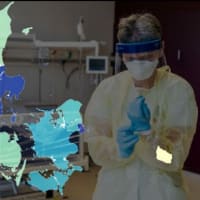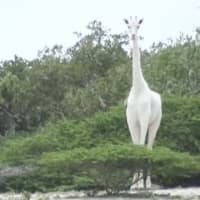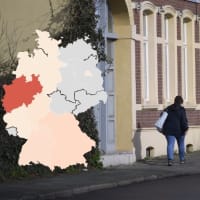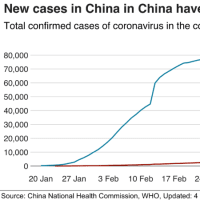2016年8月22日(Mon.) Rioでは閉会式が行われ、無事にオリンピックが終わったようです。 エッ? 無事とは言えない面もあった? それもあるのでしょうが、競技等を通して交流に寄与したり、感動や平和の有り難さをも感じさせてくれた人々に感謝したいと思います。
さて、昨日のブログで、原文の終り部分をUPしていなかったので、その分を掲載させていただきます。 (ニュースソース: DW-DE 8月17日発 )
<原文の後半>
Insectide producers disagree
Neonicotinoid manufacturers, however, deny their products has any dentrimental effects on bees, as long as users keep to the appropriate dose.
"For the regulatory approval of an insecticide, its safe use in relation to bees has to be demonstrated and product authorisations specify how insecticides should be used," the . "Unauthorised use of such products is rare. This gives us the confidence to discount insecticide use as a major contributor to poor bee health."
They blame other factors for worldwide mass deaths of bees and other pollinators: habitat loss, air pollution and, above all, varroa mites, a parasite that spreads viral deadly diseases in bee colonies.
Companies like Bayer insist neonicotinoids are essential to maintain modern agriculture.
According to a study commissioned by neonicotinoid producers Bayer, Syngenta and Valent, neonicotinoid insecticides increased crop yields in farms across North America by up to 70 percent.
A UN report on biodiversity, however, warned earlier this year, that the worldwide loss of pollinators could threaten human food supplies and cost hundreds of billions of dollars.
(抜粋)殺虫剤メーカーは否定: ネオニコチノイドの製造者は、適切な使用量を守っている限りは、蜂に対するいかなる有害性(原文: dentrimental → detrimental が正しい)もないと否定しています。 殺虫剤の規制当局承認のため、蜂に関しての安全な使用方法も開示されるべきですし、また、製造承認では殺虫剤をどのように使うのかを具体的に挙げています。 また、これらの製品に対する未公認の使い方はまれのことで、か弱い蜂の健康のための主要な因子としては、殺虫剤の使用(影響)は割り引いて考えるべきと確信的に述べています。(注: メーカーの言い分としては、殺虫剤の蜂への影響は大きくない・・・と言いたいのだと思います。)
彼ら(メーカー)は、蜂や他の受粉虫たちの世界的な大量死の要因は他にあると主張しています。 例えば、生息地の減少、大気汚染、そして、蜂のコロニーを壊滅に追いやるウィルスを広げるダニや寄生虫などが考えられるとしています。
メーカーである Bayer(注: 大手メーカー) は、ネオニコチノイドは現代農業にとって欠かせない存在になっていると強調しています。
また、このメーカーによると、北米全域の農場では、この殺虫剤によって最大70%の収量増加になっていると言います。 一方、今年(2016年)の始め、国連は生物多様性に関連して、世界的な受粉虫の減少は、人間の食糧供給や多くのコスト増大への恐れをもたらすと警告しています。

Bees are an important economic factor - not just in the production of honey
A widespread pesticide
Neonicotinoids, "neonics" for short, kill sucking insects such as aphids and soil insects such as root weevils. Compared to other registered classes of insecticides, neonics are less toxic to birds and mammals, as they attack the insects' neurosystem.
The first neonicotinoid insecticide was developed in the 1980s. Neonics became widely used in the late 1990s and early 2000s. They are registered in 120 countries and applied to combat soil pests, especially on corn, canola, cotton and sugar beet crops as well as on the vast majority of fruit and vegetables.
The EU put a temporary partial ban on neonics in 2013, prohibiting their non-commercial use as well as their use on certain crops. As an additional precaution, these insecticides may only be applied after blossom time so that pollinators come into contact with the substances as little as possible. Some countries like France are planning to ban neonicotinoids in the future.
In the US, there are no restrictions on the use of these substances. The US Environmental Protection Agency says it will complete its periodic review of neonicotinoids in 2018.
(抜粋)広がる殺虫剤: ネオニコチノイド、縮めて「neonics: ネオニクス」と呼びます。これは、アブラムシや土壌昆虫のゾウムシ(の一種)を駆除します。 他の認可済みの殺虫剤に比べて、ネオニクスは鳥や動物に対しての毒性が低く、虫の神経システムを攻撃しているのです。
最初のネオニコチノイド殺虫剤は、1980年代に開発されました。そしてネオニクスは1990年代の終盤から2000年代初頭になって広く使われるようになりました。 120カ国で登録(認可)されていて、土壌昆虫と戦っています。特に、コーン、ナタネ、綿花、テンサイなどの作物に、また、多くの果物や野菜にも適用されています。
EUは2013年、一時的にネオニクスの使用を禁止しました。特定作物への適用禁止と同様に、非営利的な使用についても禁止しています。 また、予防措置として、これらの殺虫剤の使用は、受粉虫がこの成分と接する機会を出来るだけ減らすため、開花時期が終わったものにのみに使用が許されています。 フランスなどを含むいくつかの国は、将来、ネオニコチノイドの使用を禁ずる計画をしています。
アメリカでは、これらの成分を使用することに関する制約はありません。 アメリカ環境保護局は、ネオニコチノイドの定期的な見直しを2018年に完了させる予定であると発表しています。
***
EUではネオニクスの使用は禁止状況にあるようですが、聞くところによると、日本では逆方向(緩和)に向っているとの情報も目にしたことがあります。 昨日もコメントしましたが、ものごとを安全サイド優先で考えるのであれば、制約を強化する方向に舵を切るべきではないでしょうか。
もっとも、大量生産を行う限りは(大量でなくても)、殺虫剤は使いたくなることも理解できますが、こうした「化学薬品・農薬」ではなく、自然由来のものとか、コンパニオン・プランツとの組み合わせで工夫するとか・・・。 または、日本の技術で、光や音波などを利用することで、害虫のみを寄せ付けなくするとか・・・。 まァ、容易ではないでしょうが、ミツバチや多くの受粉を手助けしてくれている虫たちを殺傷・絶滅させてはならないことが重要でもありますので、総力を挙げて研究・開発に取り組んでいただきたいものです。
土壌の虫たちをも駆除しているとなると、土壌内の生態系も破壊していることになるのでしょうね。
さらに思えば、遺伝子組み換え食品の安全性への疑念もありますし、このネオニコチノイド(ネオニクス)の人体への影響は心配しなくてよいのでしょうか。 ・・・ 気にしておきたいことの一つです。
*** Rio



***
さて、昨日のブログで、原文の終り部分をUPしていなかったので、その分を掲載させていただきます。 (ニュースソース: DW-DE 8月17日発 )
<原文の後半>
Insectide producers disagree
Neonicotinoid manufacturers, however, deny their products has any dentrimental effects on bees, as long as users keep to the appropriate dose.
"For the regulatory approval of an insecticide, its safe use in relation to bees has to be demonstrated and product authorisations specify how insecticides should be used," the . "Unauthorised use of such products is rare. This gives us the confidence to discount insecticide use as a major contributor to poor bee health."
They blame other factors for worldwide mass deaths of bees and other pollinators: habitat loss, air pollution and, above all, varroa mites, a parasite that spreads viral deadly diseases in bee colonies.
Companies like Bayer insist neonicotinoids are essential to maintain modern agriculture.
According to a study commissioned by neonicotinoid producers Bayer, Syngenta and Valent, neonicotinoid insecticides increased crop yields in farms across North America by up to 70 percent.
A UN report on biodiversity, however, warned earlier this year, that the worldwide loss of pollinators could threaten human food supplies and cost hundreds of billions of dollars.
(抜粋)殺虫剤メーカーは否定: ネオニコチノイドの製造者は、適切な使用量を守っている限りは、蜂に対するいかなる有害性(原文: dentrimental → detrimental が正しい)もないと否定しています。 殺虫剤の規制当局承認のため、蜂に関しての安全な使用方法も開示されるべきですし、また、製造承認では殺虫剤をどのように使うのかを具体的に挙げています。 また、これらの製品に対する未公認の使い方はまれのことで、か弱い蜂の健康のための主要な因子としては、殺虫剤の使用(影響)は割り引いて考えるべきと確信的に述べています。(注: メーカーの言い分としては、殺虫剤の蜂への影響は大きくない・・・と言いたいのだと思います。)
彼ら(メーカー)は、蜂や他の受粉虫たちの世界的な大量死の要因は他にあると主張しています。 例えば、生息地の減少、大気汚染、そして、蜂のコロニーを壊滅に追いやるウィルスを広げるダニや寄生虫などが考えられるとしています。
メーカーである Bayer(注: 大手メーカー) は、ネオニコチノイドは現代農業にとって欠かせない存在になっていると強調しています。
また、このメーカーによると、北米全域の農場では、この殺虫剤によって最大70%の収量増加になっていると言います。 一方、今年(2016年)の始め、国連は生物多様性に関連して、世界的な受粉虫の減少は、人間の食糧供給や多くのコスト増大への恐れをもたらすと警告しています。

Bees are an important economic factor - not just in the production of honey
A widespread pesticide
Neonicotinoids, "neonics" for short, kill sucking insects such as aphids and soil insects such as root weevils. Compared to other registered classes of insecticides, neonics are less toxic to birds and mammals, as they attack the insects' neurosystem.
The first neonicotinoid insecticide was developed in the 1980s. Neonics became widely used in the late 1990s and early 2000s. They are registered in 120 countries and applied to combat soil pests, especially on corn, canola, cotton and sugar beet crops as well as on the vast majority of fruit and vegetables.
The EU put a temporary partial ban on neonics in 2013, prohibiting their non-commercial use as well as their use on certain crops. As an additional precaution, these insecticides may only be applied after blossom time so that pollinators come into contact with the substances as little as possible. Some countries like France are planning to ban neonicotinoids in the future.
In the US, there are no restrictions on the use of these substances. The US Environmental Protection Agency says it will complete its periodic review of neonicotinoids in 2018.
(抜粋)広がる殺虫剤: ネオニコチノイド、縮めて「neonics: ネオニクス」と呼びます。これは、アブラムシや土壌昆虫のゾウムシ(の一種)を駆除します。 他の認可済みの殺虫剤に比べて、ネオニクスは鳥や動物に対しての毒性が低く、虫の神経システムを攻撃しているのです。
最初のネオニコチノイド殺虫剤は、1980年代に開発されました。そしてネオニクスは1990年代の終盤から2000年代初頭になって広く使われるようになりました。 120カ国で登録(認可)されていて、土壌昆虫と戦っています。特に、コーン、ナタネ、綿花、テンサイなどの作物に、また、多くの果物や野菜にも適用されています。
EUは2013年、一時的にネオニクスの使用を禁止しました。特定作物への適用禁止と同様に、非営利的な使用についても禁止しています。 また、予防措置として、これらの殺虫剤の使用は、受粉虫がこの成分と接する機会を出来るだけ減らすため、開花時期が終わったものにのみに使用が許されています。 フランスなどを含むいくつかの国は、将来、ネオニコチノイドの使用を禁ずる計画をしています。
アメリカでは、これらの成分を使用することに関する制約はありません。 アメリカ環境保護局は、ネオニコチノイドの定期的な見直しを2018年に完了させる予定であると発表しています。
***
EUではネオニクスの使用は禁止状況にあるようですが、聞くところによると、日本では逆方向(緩和)に向っているとの情報も目にしたことがあります。 昨日もコメントしましたが、ものごとを安全サイド優先で考えるのであれば、制約を強化する方向に舵を切るべきではないでしょうか。
もっとも、大量生産を行う限りは(大量でなくても)、殺虫剤は使いたくなることも理解できますが、こうした「化学薬品・農薬」ではなく、自然由来のものとか、コンパニオン・プランツとの組み合わせで工夫するとか・・・。 または、日本の技術で、光や音波などを利用することで、害虫のみを寄せ付けなくするとか・・・。 まァ、容易ではないでしょうが、ミツバチや多くの受粉を手助けしてくれている虫たちを殺傷・絶滅させてはならないことが重要でもありますので、総力を挙げて研究・開発に取り組んでいただきたいものです。
土壌の虫たちをも駆除しているとなると、土壌内の生態系も破壊していることになるのでしょうね。
さらに思えば、遺伝子組み換え食品の安全性への疑念もありますし、このネオニコチノイド(ネオニクス)の人体への影響は心配しなくてよいのでしょうか。 ・・・ 気にしておきたいことの一つです。
*** Rio



***




















※コメント投稿者のブログIDはブログ作成者のみに通知されます